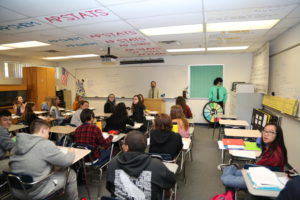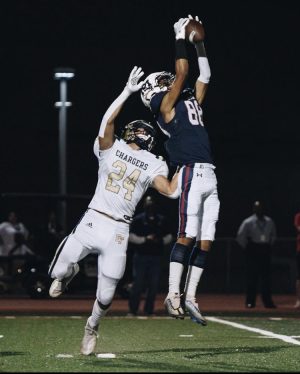RESOLVED: McClintock’s congressional debate team shows skill
October 16, 2015
The air is tense as the weight of responsibility settles on all the representatives’ shoulders. Speaker of the House John Boehner invited them to the Select Committee in recognition of their skill in debate and quality as congresspersons to serve one purpose: determine how to respond to Russian military action in the nation of Syria.
In other words? Change the fate of the world. Time provided to change the fate of the world?
Three minutes.
Three minutes: that’s how much time you’re allowed to give a speech and try to influence the course of a nation, the path of a globe, the fate of the world.
The chamber acquires a slightly frantic atmosphere as representatives prepare to give their speeches either for or against the legislation, analyzing other speakers’ arguments on the fly in order to either augment or break them. Such is the nature of Congressional Debate in high schools across the nation, and such was the nature of one tournament in Arizona: the annual Prep School Congress that McClintock Speech and Debate attended.
Congressional Debate, otherwise known as Mock Congress, is one of four debate events in the National Speech and Debate Association (NSDA) and is a simulation of the legislative process in the United States Congress. Approximately 20 students debate with one another in a single “chamber,” emulating the role of a congressperson and taking turns giving speeches in proposition or opposition of proposed legislation.
“What I like about congress is that it provides concrete solutions to many issues we face, and unlike other forms of debate it allows the competitors to truly interact with one another as if we were actually in congress,” junior Erin Granillo-Walker, congressional debate co-captain, said.
Most debate events in the NSDA involve either two debaters clashing with one another over a single issue or two pairs of debaters clashing with one another. Congressional Debate on the other hand can involve upwards of twenty debaters speaking on multiple issues in a single round, referred to in Congressional Debate as a “session” of Congress.
Congressional Debate’s origins come from the famous Robert’s Rules of Order, a set of rules for parliamentary procedure published by US Brigadier General Henry Martyn Robert in 1876. All rules and procedure in Congressional Debate are derived from these rules, and while knowledge of Robert’s Rules themselves isn’t necessary to be a successful congressional debater, a thorough understanding of “parliamentary procedure,” or the procedure by which a chamber is run, is as essential to performing well in a session as rhetoric and argumentation.
“Congressional debate is unlike any other event in its magnitude and its blending of aspects from other events,” junior Ben Pope said. “In this event you must do research, you must perform your speech in order to make it entertaining, and you must debate with others. This final aspect is one of the largest differences between this event and any other. In congressional debate you must answer to as well as question dozens of people who are all competing for the judges’ favor and lasting impression.”
Congressional Debate can be considered to happen in four phases: writing legislation prior to a tournament, researching arguments concerning legislation prior to a tournament, caucusing at the beginning of a tournament, and debating in session at the tournament itself.
The legislation debated by competitors at tournaments is generally drafted and submitted by participating schools.
“To write legislation for tournaments, typically the team or specific members come up with ideas for bills and resolutions based on current events or other issues that [we] would like to see resolved in real Congress,” Granillo-Walker said. “Once we decide the thesis of the legislation, we format the legislation using a template for a bill or resolution, ironing out details along the way. After a few rounds of editing, we submit the legislation to the tournament.”
After legislation has been submitted by participating schools, the docket – the list of legislation that has the potential to be debated at a tournament – is released publicly and competitors must prepare for the tournament by researching arguments for and against all the legislation. Evidence – reputable publications generally consisting of either news articles, studies, or persuasive writings – must be collected in order to give arguments used in debate support and backing; an argument without evidence cannot strictly be determined to be based in truth, meaning that possessing evidence is absolutely paramount.
While it is unlikely that all the legislation on the docket will be debated (upwards of ten pieces of legislation are generally submitted at each tournament, and it is typical to have enough time to debate only four), it is impossible to know for certain what will and won’t be debated until one arrives at the tournament.
When one does arrive at the tournament, one of the first orders of business is caucusing, or meeting with the other competitors in the chamber and trying to come to a consensus on the chamber’s docket, or the order in which legislation will be debated. When the session begins, a vote is held to determine what the order will be, and competitors finally know with a measure of certainty what legislation will be debated.
Finally, debate can begin. Competitors begin debate on the first piece of legislation on the docket and take turns giving speeches arguing in favor or against passage of the legislation. When debate on a specific legislation is brought to a close, a vote is held and the legislation is either passed or failed depending on the decision of the competitors within the chamber.
“I starting competing in Congressional debate the November of my freshman year. Politics has always been an area of interest for me, and Congressional debate is a fantastic way for students to engage in politics and further learn about issues facing the world today,” Granillo-Walker said.
Many pieces of legislation debated in Congressional Debate at tournaments relate to matters affecting Americans in the present – by researching arguments for and against legislation, students can be exposed to much more information about the world they live in than they might otherwise.
McClintock’s Speech and Debate team recently competed in Congressional Debate at the Prep School Congress tournament organized by Tempe Preparatory Academy and hosted by Scottsdale Preparatory Academy. Unlike most tournaments, the Prep School Congress offered no events to compete in other than congress, making the single event the focus of all the competitors that day. That wasn’t the only unusual element of the tournament, though.
“Unlike most tournaments, the prep school congress tournament had two preliminary sessions – or rounds – and then went to finals, and rather than normal legislation there was a ‘scenario,’” Granillo-Walker said.
“A scenario-based final means that instead of debating the passage of bills, the chamber must debate the course of action that should be taken in response to some hypothetical crisis. This tournament’s scenario was ‘Russia has just mobilized troops in Syria and is attacking enemies of Bashar Al-Assad. How should the US Gov. react?’” Pope said.
Debaters participating in a tournament with scenario generally aren’t privy to all the information of the scenario until the day of the tournament, making debate in scenario much more high pressure, as one isn’t able to rely on prior preparation as much.
Regardless of how many surprises the Prep School Congress had for McClintock Speech and Debate, the team performed well with three McClintock students breaking to the final round of the tournament with one, Pope, placing in sixth, receiving a gavel as his trophy.
“Placing means a lot to me and the team because it validates all of the effort we’ve been putting into this event this year, and it sets us up as a formidable contender in this year’s congressional debate,” Pope said.
In the end, Congressional Debate is an intensive form of debate that exposes students to many issues and crises facing the world and develops in them greater skill in research, analysis, argumentation, and rhetoric. All work and no play, though, makes anyone a very dull congressperson, so it’s not to say that Congressional Debate doesn’t have its moments of levity.
“Congressional debate is such a random event that no two sessions are ever the same, and this leads to plenty of memorable moments,” Pope said. “For example, one time in particular comes to mind. We were debating a bill to sanction Russia for its actions in Ukraine and one speaker went up to the front of the chamber, pulled out a picture of Vladimir Putin, and kissed it proclaiming, ‘This man is equal parts attractive and dangerous, and thus we must act quickly.’”
The next tournament McClintock Speech and Debate plans on competing in Congressional Debate at is the Dobson Invitational on Nov. 20.



